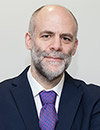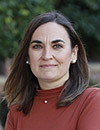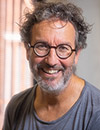Plenary Event
Sensors + Imaging Plenary Session
15 September 2025 • 15:30 - 17:55 CEST
15:30 to 15:40 hrs
Welcome and Introduction
15:40 to 16:25 hrs
Space-based QKD, drivers and perspectives

Ángel Álvaro Sánchez, Thales Alenia Space (Spain)
Satellite based Quantum Key Distribution systems appear as a potential solution to cover long distance links that cannot be satisfied through fiber links due to current technological limitations that confine fiber based QKD links to hundreds of kilometers. In this frame, different alternatives are being evaluated involving both geostationary and low earth orbit. Both approaches present advantages and disadvantages that will very likely lead to hybrid space based systems that will integrate with Ground QKD networks and service different end users very much like current space based telecom systems integrate in the global network.
Current technical discussions focus mainly on the nature and implementation of the Physical quantum link and the different QKD protocols implementations and vulnerabilities. For a change, this lecture presents the nature and constraints of satellite based QKD system from an end to end point of view, focusing on systemic elements beyond, but considering, the quantum link. Differences and commonalities between LEO and GEO are discussed for key management, scheduling, and other elements of the system impacting the associated classic channel, such as the signalling, the strategy and formats for pulse identification or the error correction protocols. Derived from this, the perspective that, by its own nature, QKD systems are meant to exist in close interaction with the classic telecommunication systems they are meant to protect shall be presented.
Biography: Ángel Álvaro Sánchez (Thales Alenia Space España) is the Technical Director of the Spanish GEO QKD initiative targeting a full end to end QKD service based on a geostationary payload by 2028. Master Telecommunications Engineer, graduated in 1997 by Politechnic University in Madrid, has more than 29 years experience in the space sector, starting at Alcatel Space as digital equipment designer, he has been responsible for the digital engineering group and technical responsible of digital units for programs like Rosetta, Mars Express or AmerHis. He was appointed Chief Operations Officer, position that he covered 5 years. After the transition from Alcatel to Thales, in 2009 Angel returns to the technical activity and occupies a position within the Technical Direction at Thales Alenia Space Spain. In that position he has been involved in many European R&D projects both under ESA and European Commission. Angel also shares his technical background as Assistant Lecturer in Satellite Communications at Rey Juan Carlos University
16:25 to 17:10 hrs
Opportunities and challenges of high-resolution satellites for hydrology applications: insights from snow-influenced regions

María José Polo, Univ. of Cordoba (Spain)
The availability of high-resolution products from the recent satellite missions opens a broad field for new or enhanced applications in hydrology, especially in the framework of water fluxes modelling and/or state variables, such as estimations of evapotranspiration over large areas or soil moisture fields. The scale effects of a coarse mapping of such variables on the resulting modelled variables can strongly affect the accuracy and skill of hydrological models, and therefore pose a constraint for the further embedment of remote sensing data into forecasting schemes or scenario assessments. The new context offers the possibility of not only increasing the skill of models to assess the spatial variability of descriptors and processes in heterogeneous areas, but also to quantify man-operated management issues that greatly impact the hydrological processes on the local scale (i.e. irrigation practices, reservoir operation, and modification of the soil surface), and the water budget on the global scale.
To highlight these opportunities, specific examples from snow-dominated areas will be assessed, with focus on key states, such as the initiation of melting, roughness or snow depth, and their relevance for global warming assessment of scenarios and adaptation strategies, or forecasting of floods in alert-systems. Current limitations and challenges for an efficient merging of different data sources in such applications will be also addressed.
Biography: María José Polo María José Polo is full professor of hydraulic engineering at the University of Cordoba (Spain) since 2016. She has worked in hydrology with focus on improving the physical representation of processes in distributed modelling when heterogeneity if a major issue; her research on snow dynamics and mountain hydrology in southern Spain has contributed to the study of hydrology in Mediterranean regions and the development of hydrological and climate services for short and long term forecasting and planning. The applications and use of remote sensing to monitor hydrological processes have also an important role in her work; she has been vice-president of the International Commission of Remote Sensing (ICRS) of the IAHS since 2015 and recently chaired and hosted the International Symposium of Remote Sensing and Hydrology (RSHS’18 in Cordoba), a 4-yr forum promoted by ICRS. She also leads the IAHS Working Group of Water and Energy Fluxes in a Changing Environment (Panta Rhei Hydrological Decade).
She obtained her B.S. in Agricultural Engineering in 1992 (receiving the 2nd National Award) and the PhD degree in Environmental Engineering in 1997 (with the University Award, the Environment Award by Fundacion-Caja Madrid, and the Fertiberia Award to best PhD thesis) and started at the University of Cordoba as associate professor in 1999, where she has supervised 13 PhD students and actively participated in different national and international projects, including LIFE, FP7, and H2020 programs. Her current WOS h-index is 15 (Scholar h-index: 20) and she has been author of 71 papers (WOS indexed) and 100+ conference proceedings. In 2010, her research received the Social Council Award of the University of Cordoba for the transfer of knowledge on hydrology and services to society.
She acts as reviewer for 20+ international scientific journals and is currently guest editor of a special issue in Water on Climate Change Impact on the Snowfall Regime in the Mediterranean Area. From 2012 on, Prof. Polo has been the Scientific Head at the University of Cordoba of the Andalusian Institute for Earth System Research. She was appointed as collaborator of the Spanish Research Agency in 2017, in the Civil Engineering Panel, as representative of Hydraulics engineering and hydrology.
17:10 to 17:55 hrs
Extreme weather: historical and contemporary flood events in the Mediterranean

David Pino, Univ. Politècnica de Catalunya (Spain)
The Mediterranean climate is characterized by hydrometeorological extremes (floods and droughts). Their impacts have probably increased due to climate change, increased vulnerability and, more importantly, exposure caused by human activity. The talk will show the necessity of tackling this type of events with a multi- and interdisciplinary approach (climatology, hydrology, history, geography, and disaster risk management) to explore the evolution, impact, and memory of floods across the region.
Special focus will be given to two emblematic recent events: Storm Gloria (2020), which severely affected eastern Spain and parts of the western Mediterranean, and the 2024 DANA (Isolated Depression at High Levels in Spanish), which caused widespread flooding in Valencia and how remote sensing has introduced new tools to analyze their impacts.
Biography: David Pino is a full professor at the Department of Physics at the Universitat Politècnica de Catalunya (UPC, Spain). Professor Pino has been studying various aspects of the dynamics and composition of the atmospheric boundary layer for the last 20 years. During the last 10 years is research has focused mainly on analyzing the atmospheric and hydrological conditions, impacts and climatic evolution of the floods affecting the Spanish Mediterranean basin during the last millennium.
Collaboration with researchers from different disciplines has allowed the team to build up an extensive archive, encompassing more than 10,000 episodes that includes over 35,000 documented cases that provides critical insights into the historical patterns of extreme weather events and their socio-environmental impacts. The research aims to inform climate risk management and territorial planning in the face of increasing hydrometeorological hazards.
Welcome and Introduction
15:40 to 16:25 hrs
Space-based QKD, drivers and perspectives

Ángel Álvaro Sánchez, Thales Alenia Space (Spain)
Satellite based Quantum Key Distribution systems appear as a potential solution to cover long distance links that cannot be satisfied through fiber links due to current technological limitations that confine fiber based QKD links to hundreds of kilometers. In this frame, different alternatives are being evaluated involving both geostationary and low earth orbit. Both approaches present advantages and disadvantages that will very likely lead to hybrid space based systems that will integrate with Ground QKD networks and service different end users very much like current space based telecom systems integrate in the global network.
Current technical discussions focus mainly on the nature and implementation of the Physical quantum link and the different QKD protocols implementations and vulnerabilities. For a change, this lecture presents the nature and constraints of satellite based QKD system from an end to end point of view, focusing on systemic elements beyond, but considering, the quantum link. Differences and commonalities between LEO and GEO are discussed for key management, scheduling, and other elements of the system impacting the associated classic channel, such as the signalling, the strategy and formats for pulse identification or the error correction protocols. Derived from this, the perspective that, by its own nature, QKD systems are meant to exist in close interaction with the classic telecommunication systems they are meant to protect shall be presented.
Biography: Ángel Álvaro Sánchez (Thales Alenia Space España) is the Technical Director of the Spanish GEO QKD initiative targeting a full end to end QKD service based on a geostationary payload by 2028. Master Telecommunications Engineer, graduated in 1997 by Politechnic University in Madrid, has more than 29 years experience in the space sector, starting at Alcatel Space as digital equipment designer, he has been responsible for the digital engineering group and technical responsible of digital units for programs like Rosetta, Mars Express or AmerHis. He was appointed Chief Operations Officer, position that he covered 5 years. After the transition from Alcatel to Thales, in 2009 Angel returns to the technical activity and occupies a position within the Technical Direction at Thales Alenia Space Spain. In that position he has been involved in many European R&D projects both under ESA and European Commission. Angel also shares his technical background as Assistant Lecturer in Satellite Communications at Rey Juan Carlos University
16:25 to 17:10 hrs
Opportunities and challenges of high-resolution satellites for hydrology applications: insights from snow-influenced regions

María José Polo, Univ. of Cordoba (Spain)
The availability of high-resolution products from the recent satellite missions opens a broad field for new or enhanced applications in hydrology, especially in the framework of water fluxes modelling and/or state variables, such as estimations of evapotranspiration over large areas or soil moisture fields. The scale effects of a coarse mapping of such variables on the resulting modelled variables can strongly affect the accuracy and skill of hydrological models, and therefore pose a constraint for the further embedment of remote sensing data into forecasting schemes or scenario assessments. The new context offers the possibility of not only increasing the skill of models to assess the spatial variability of descriptors and processes in heterogeneous areas, but also to quantify man-operated management issues that greatly impact the hydrological processes on the local scale (i.e. irrigation practices, reservoir operation, and modification of the soil surface), and the water budget on the global scale.
To highlight these opportunities, specific examples from snow-dominated areas will be assessed, with focus on key states, such as the initiation of melting, roughness or snow depth, and their relevance for global warming assessment of scenarios and adaptation strategies, or forecasting of floods in alert-systems. Current limitations and challenges for an efficient merging of different data sources in such applications will be also addressed.
Biography: María José Polo María José Polo is full professor of hydraulic engineering at the University of Cordoba (Spain) since 2016. She has worked in hydrology with focus on improving the physical representation of processes in distributed modelling when heterogeneity if a major issue; her research on snow dynamics and mountain hydrology in southern Spain has contributed to the study of hydrology in Mediterranean regions and the development of hydrological and climate services for short and long term forecasting and planning. The applications and use of remote sensing to monitor hydrological processes have also an important role in her work; she has been vice-president of the International Commission of Remote Sensing (ICRS) of the IAHS since 2015 and recently chaired and hosted the International Symposium of Remote Sensing and Hydrology (RSHS’18 in Cordoba), a 4-yr forum promoted by ICRS. She also leads the IAHS Working Group of Water and Energy Fluxes in a Changing Environment (Panta Rhei Hydrological Decade).
She obtained her B.S. in Agricultural Engineering in 1992 (receiving the 2nd National Award) and the PhD degree in Environmental Engineering in 1997 (with the University Award, the Environment Award by Fundacion-Caja Madrid, and the Fertiberia Award to best PhD thesis) and started at the University of Cordoba as associate professor in 1999, where she has supervised 13 PhD students and actively participated in different national and international projects, including LIFE, FP7, and H2020 programs. Her current WOS h-index is 15 (Scholar h-index: 20) and she has been author of 71 papers (WOS indexed) and 100+ conference proceedings. In 2010, her research received the Social Council Award of the University of Cordoba for the transfer of knowledge on hydrology and services to society.
She acts as reviewer for 20+ international scientific journals and is currently guest editor of a special issue in Water on Climate Change Impact on the Snowfall Regime in the Mediterranean Area. From 2012 on, Prof. Polo has been the Scientific Head at the University of Cordoba of the Andalusian Institute for Earth System Research. She was appointed as collaborator of the Spanish Research Agency in 2017, in the Civil Engineering Panel, as representative of Hydraulics engineering and hydrology.
17:10 to 17:55 hrs
Extreme weather: historical and contemporary flood events in the Mediterranean

David Pino, Univ. Politècnica de Catalunya (Spain)
The Mediterranean climate is characterized by hydrometeorological extremes (floods and droughts). Their impacts have probably increased due to climate change, increased vulnerability and, more importantly, exposure caused by human activity. The talk will show the necessity of tackling this type of events with a multi- and interdisciplinary approach (climatology, hydrology, history, geography, and disaster risk management) to explore the evolution, impact, and memory of floods across the region.
Special focus will be given to two emblematic recent events: Storm Gloria (2020), which severely affected eastern Spain and parts of the western Mediterranean, and the 2024 DANA (Isolated Depression at High Levels in Spanish), which caused widespread flooding in Valencia and how remote sensing has introduced new tools to analyze their impacts.
Biography: David Pino is a full professor at the Department of Physics at the Universitat Politècnica de Catalunya (UPC, Spain). Professor Pino has been studying various aspects of the dynamics and composition of the atmospheric boundary layer for the last 20 years. During the last 10 years is research has focused mainly on analyzing the atmospheric and hydrological conditions, impacts and climatic evolution of the floods affecting the Spanish Mediterranean basin during the last millennium.
Collaboration with researchers from different disciplines has allowed the team to build up an extensive archive, encompassing more than 10,000 episodes that includes over 35,000 documented cases that provides critical insights into the historical patterns of extreme weather events and their socio-environmental impacts. The research aims to inform climate risk management and territorial planning in the face of increasing hydrometeorological hazards.
